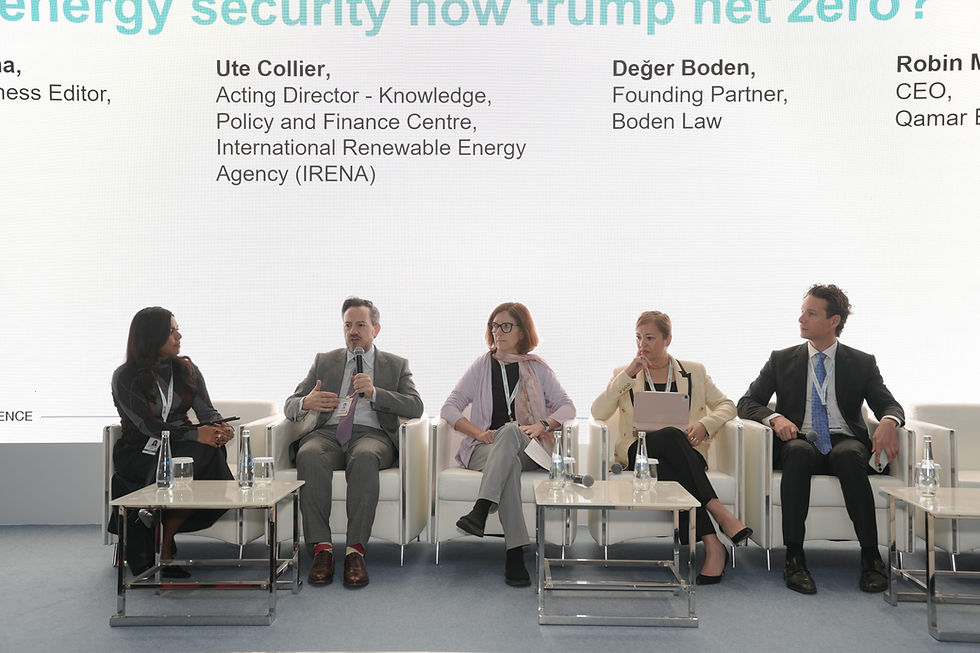Jeffrey Beyer on rethinking our approach to energy, water, and the circular economy
- Zest Associates

- Apr 14, 2022
- 3 min read
Managing Director of Zest Associates Jeffrey Beyer moderated the final panel at the 2022 EDF Energy Series that discussed strategies and solutions to the interconnections and dependencies between energy and water.

Held at Expo 2020’s French Pavilion, the last installment of the series explored successful approaches in addressing water-energy challenges through technological innovation, investment and good governance.
“Energy and water are intertwined and can be complementary, but are sometimes in competition with one another,” said Beyer. “It was a pleasure to moderate the final high-level panel discussion with the brilliant contributions from our speakers to unpack how these challenges are being met in the MENA region.”
The conference was held at EDF Renewables Middle East’s Energy and Water Summit in Dubai and featured several experts from the MENA region.
“This topic is highly relevant, not only in the Gulf region but around the world,” said Mr. Eddie Rich, CEO of the International Hydropower Association who introduced the speakers. “Hydropower has a role to play even in the Middle East, where dams used for irrigation can be refurbished to provide hydroelectricity.”
The discussion included Amer Alrajiba, VP of Capacity Planning & Analysis at the Saudi Water Partnership Company, Bruno Fyot, Chief Operating Officer of EDF Renewables, and Valerie Levkov, the Senior Vice President of EDF Group in the MENA region.
Amer Alrajiba, who helped establish the National Water Company while at the Ministry of Water & Electricity in Saudi Arabia, outlined potential solutions to water security in the country. Among them include addressing key infrastructural challenges, as well as shifting the region’s dependency away from non-renewable aquifers.
“The accessibility of water is the main issue and out of the 13 regions in the kingdom, four of them are completely dependent on groundwater,” said Alrajiba. “We used to have zero operational storage. We are working on three-day storage by 2025 and by 2030, we will have 7-day operational storage, which we can use directly without treatment.”
“It’s important to have a circular pipeline network that connects east, middle and west to ensure that we have sustainable water resources” Alrajiba added, highlighting Saudi Arabia’s uneven resource allocations and population density.
The wide-ranging discussion also touched on issues facing African and European nations.
Valerie Levkov discussed the need to protect the 600 million people in African regions facing energy insecurity, and those who intimately rely on natural resources for agricultural production.
“The social impacts are very important,” said Levkov. “What’s been proven is when you build an [energy] asset and keep in mind the potential impact of the population where the production takes place, you should see a huge increase in the GDP of the region.”
The final portion of the panel highlighted pathways forward, and new technologies on the horizon that are essential to the energy transition. Bruno Fyot spoke on floating offshore wind energy turbines, a promising technology that will let developers capture stronger and more consistent offshore wind resources in deep water.
“We are building two pilot projects, one in France and one in the UK … and the future potential is huge,” said Fyot. “We are doing a lot of work to make sure this is something for which we will have a competitive advantage … we saw the price at 200 dollars [per megawatt-hour] just seven years ago, and since then, it’s dramatically decreased.”
Taking a different perspective, Levkov highlighted the potential for small modular reactors (SMR). These are smaller-than-typical nuclear reactors that may be deployed within a decade to power major industrial sites, produce process heat or drive desalination.
“Firstly there is the benefit of decarbonized energy. Second, their size is conducive to installation in many types of countries, and third, it better manages water usage and supply,” Levkov said.
Much needs to be done as we advance towards sustainable development. There remains a need for technology innovation, a requirement to scale up investment, and competition from incumbent industries and technologies that still dominate the energy space.
But the creative solutions used in countries across the globe show many potential paths forward.
“There is a balance between innovation and deployment,” said Jeffrey Beyer. “We need to both accelerate and scale up deployment of energy and water technologies that are already mature but we also need new technologies to reach net zero. It’s the responsibility of both policy makers and businesses like EDF to strike the right balance, providing decarbonised, affordable and secure energy supply while protecting and enhancing our water resources.”


Comments